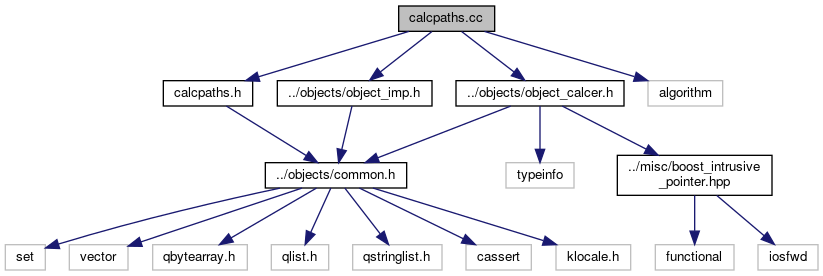kig
#include "calcpaths.h"#include "../objects/object_calcer.h"#include "../objects/object_imp.h"#include <algorithm>
Go to the source code of this file.
Macros | |
| #define | NEWCALCPATH |
Functions | |
| bool | addBranch (const std::vector< ObjectCalcer * > &o, const ObjectCalcer *to, std::vector< ObjectCalcer * > &ret) |
| static void | addNonCache (ObjectCalcer *o, std::vector< ObjectCalcer * > &ret) |
| std::vector< ObjectCalcer * > | calcPath (const std::vector< ObjectCalcer * > &os) |
| std::vector< ObjectCalcer * > | calcPath (const std::vector< ObjectCalcer * > &from, const ObjectCalcer *to) |
| std::set< ObjectCalcer * > | getAllChildren (ObjectCalcer *obj) |
| std::set< ObjectCalcer * > | getAllChildren (const std::vector< ObjectCalcer * > objs) |
| std::vector< ObjectCalcer * > | getAllParents (const std::vector< ObjectCalcer * > &objs) |
| std::vector< ObjectCalcer * > | getAllParents (ObjectCalcer *obj) |
| bool | isChild (const ObjectCalcer *o, ObjectCalcer *op) |
| bool | isChild (const ObjectCalcer *o, const std::vector< ObjectCalcer * > &os) |
| bool | isPointOnCurve (const ObjectCalcer *point, const ObjectCalcer *curve) |
| void | localdfs (ObjectCalcer *obj, std::vector< ObjectCalcer * > &visited, std::vector< ObjectCalcer * > &all) |
| std::vector< ObjectCalcer * > | sideOfTreePath (const std::vector< ObjectCalcer * > &from, const ObjectCalcer *to) |
| static bool | visit (const ObjectCalcer *o, const std::vector< ObjectCalcer * > &from, std::vector< ObjectCalcer * > &ret) |
Macro Definition Documentation
| #define NEWCALCPATH |
Definition at line 42 of file calcpaths.cc.
Function Documentation
| bool addBranch | ( | const std::vector< ObjectCalcer * > & | o, |
| const ObjectCalcer * | to, | ||
| std::vector< ObjectCalcer * > & | ret | ||
| ) |
Definition at line 143 of file calcpaths.cc.
|
static |
Definition at line 178 of file calcpaths.cc.
| std::vector<ObjectCalcer*> calcPath | ( | const std::vector< ObjectCalcer * > & | os | ) |
This function sorts os such that they're in the right order for calc()-ing.
This means that child objects must appear after their parents ( for you graph people, this is just a topological sort.. )
Definition at line 48 of file calcpaths.cc.
| std::vector<ObjectCalcer*> calcPath | ( | const std::vector< ObjectCalcer * > & | from, |
| const ObjectCalcer * | to | ||
| ) |
This is a different function for more or less the same purpose.
It takes a few Objects, which are considered to have been calced already. Then, it puts the necessary part of their children in the right order, so that calc()-ing correctly updates all of their data ( they're calc'ed in the right order, i mean... ). The objects in from are normally not included in the output, unless they appear somewhere in the middle of the calc-path towards to ...
Definition at line 160 of file calcpaths.cc.
| std::set<ObjectCalcer*> getAllChildren | ( | ObjectCalcer * | obj | ) |
This is an overloaded member function, provided for convenience. It differs from the above function only in what argument(s) it accepts.
Definition at line 281 of file calcpaths.cc.
| std::set<ObjectCalcer*> getAllChildren | ( | const std::vector< ObjectCalcer * > | objs | ) |
This function returns all objects below the objects in objs in the dependency graphy.
The objects in objs are also included themselves..
Definition at line 288 of file calcpaths.cc.
| std::vector<ObjectCalcer*> getAllParents | ( | const std::vector< ObjectCalcer * > & | objs | ) |
This function returns all objects above the given in the dependency graph.
The given objects objs are also included themselves..
Definition at line 229 of file calcpaths.cc.
| std::vector<ObjectCalcer*> getAllParents | ( | ObjectCalcer * | obj | ) |
This is an overloaded member function, provided for convenience. It differs from the above function only in what argument(s) it accepts.
Definition at line 249 of file calcpaths.cc.
| bool isChild | ( | const ObjectCalcer * | o, |
| ObjectCalcer * | op | ||
| ) |
Definition at line 256 of file calcpaths.cc.
| bool isChild | ( | const ObjectCalcer * | o, |
| const std::vector< ObjectCalcer * > & | os | ||
| ) |
Returns true if o is a descendant of any of the objects in os.
Definition at line 263 of file calcpaths.cc.
| bool isPointOnCurve | ( | const ObjectCalcer * | point, |
| const ObjectCalcer * | curve | ||
| ) |
Return true if the given point is ( by construction ) on the given curve.
This means that it is either a constrained point on the curve, or the curve is constructed through the point, or the point is an intersection point of the curve with another curve. Note that it is assumed that the given point is in fact a point and the given curve is in fact a curve.
Definition at line 309 of file calcpaths.cc.
| void localdfs | ( | ObjectCalcer * | obj, |
| std::vector< ObjectCalcer * > & | visited, | ||
| std::vector< ObjectCalcer * > & | all | ||
| ) |
Definition at line 73 of file calcpaths.cc.
| std::vector<ObjectCalcer*> sideOfTreePath | ( | const std::vector< ObjectCalcer * > & | from, |
| const ObjectCalcer * | to | ||
| ) |
This function returns all objects on the side of the path through the dependency tree from from down to to .
This means that we look for any objects that don't depend on any of the objects in from themselves, but of which one of the direct children does. We need this function for Locus stuff...
Definition at line 222 of file calcpaths.cc.
|
static |
Definition at line 193 of file calcpaths.cc.
Documentation copyright © 1996-2020 The KDE developers.
Generated on Mon Jun 22 2020 13:12:05 by doxygen 1.8.7 written by Dimitri van Heesch, © 1997-2006
KDE's Doxygen guidelines are available online.
 KDE API Reference
KDE API Reference